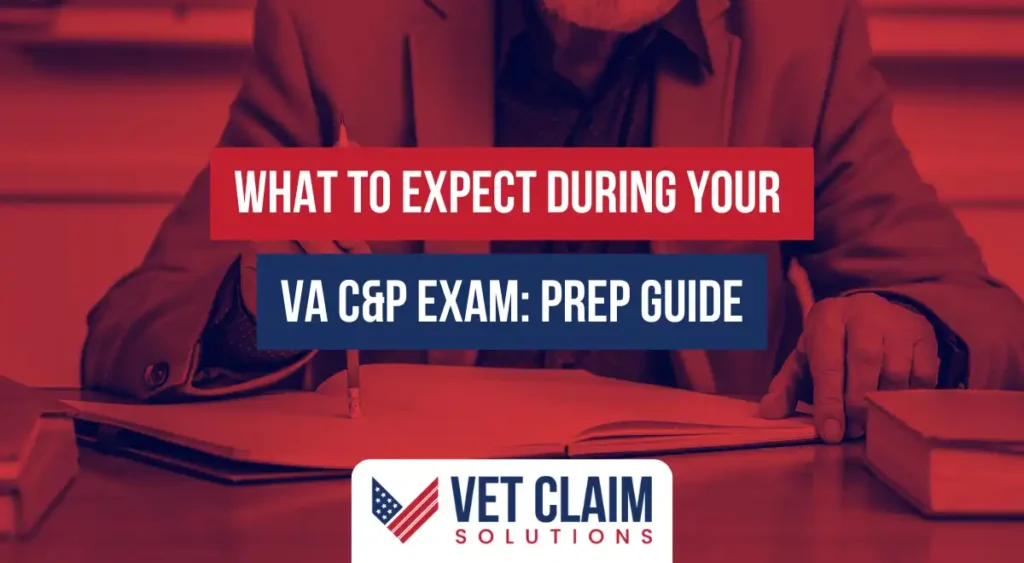The thought of a VA Compensation and Pension (C&P) exam can bring a lot of questions and uncertainty. You might feel anxious or unsure about what’s going to happen during this crucial step in your disability claim. Many veterans feel this way because this medical exam is a significant part of determining eligibility for VA disability benefits and the disability compensation you’ll receive. This guide will walk you through what to expect during your VA C&P exam, explaining the Compensation & Pension exam process and how to prepare for it, helping you feel more ready and confident.
Knowing what’s coming can make a real difference in how you approach this appointment. Understanding the purpose, the procedures, and your role in the exam can empower you. We’ll cover the essentials, from pre-exam preparation to what happens after your exam, so you are well-informed about this important part of the VA claims process.

Understanding the VA C&P Exam
A VA Compensation and Pension exam, often shortened to C&P exam, is a medical appointment scheduled by the Department of Veterans Affairs (VA). Its primary purpose is to gather medical information about your claimed disability or health condition. The VA uses the findings from these health exams to make a decision on your claim for benefits, which could include disability compensation or pension benefits.
It’s very important to understand that a C&P exam is not for treatment purposes; it is an evaluation. The examiner, whether a VA medical professional or a contracted doctor, will not prescribe medication, offer medical advice for ongoing health care, or provide treatment during this appointment. Their sole function is to assess your condition as it relates to your military service and the specifics of your VA claim.
This exam is different from a regular visit to your doctor at a local VA medical center or private medical center. While your regular doctor focuses on your treatment and overall well-being, the C&P examiner focuses on specific questions posed by the VA to evaluate your disability. This objective assessment is critical for the VA to process your claim accurately.
Why is a C&P Exam Necessary?
The VA requires these exams for several key reasons, primarily to fulfill its obligation in the claims process. First, C&P exams help establish or confirm that your current health condition is connected to your military service; this connection is often called a nexus. Without a clear nexus, it’s difficult for the VA to approve service connection for a disability claim.
Second, the exam helps determine the current severity of your condition. This severity assessment is a major factor in calculating your disability rating if your claim is approved, which in turn impacts the amount of monthly payments for disability compensation you’ll receive. The VA has a responsibility, known as the duty to assist, to help veterans gather the evidence needed to support their claim, and the C&P exam is a fundamental part of this assistance.
The duty to assist means the VA will help you obtain relevant records and schedule necessary exams, but it’s still beneficial for you to be proactive in your claim. Understanding the necessity of the C&P exam can help you approach it with the seriousness it deserves, ensuring you provide the examiner with the information they need to accurately report on your physical health or mental health condition.
Who Conducts the C&P Exam?
C&P exams are conducted by VA medical professionals working at a VA medical facility or by physicians contracted by the VA through third-party companies. Some well-known VA contractors include QTC Management (QTC), Veterans Evaluation Services (VES), and LHI/Optum Serve. These professionals are trained to perform evaluations according to VA guidelines.
You typically do not get to choose your specific exam provider or the location of your exam. The VA or their contractor will handle the scheduling process and will notify you of the appointment. You will receive an official exam letter or a phone call with all the details, including the date, time, location (which could be a local VA medical center or a contractor’s clinic), and the name of the examiner, if available.
These examiners are expected to have the appropriate medical expertise for the conditions being evaluated. If you have concerns about the assigned examiner’s qualifications or the facility, you may contact the scheduling entity, but options to change are generally limited unless there’s a significant conflict or issue. It’s important to attend the scheduled exam to avoid delays or potential denial of your claim due to a missed exam.

Before Your C&P Exam: Essential Preparation
Thorough preparation can significantly influence how smoothly your C&P exam proceeds. Taking the time to get ready can not only boost your confidence but also ensure the examiner receives all the necessary information to make an accurate assessment of your health condition. This proactive approach is beneficial for your VA disability claim.
Review Your Records Thoroughly
Before your exam, you should carefully review medical records and all documents related to your health care and military service. This includes your Service Medical Records (SMRs); look for entries about in-service injuries, illnesses, treatments, or complaints relevant to your claimed conditions. Your private medical records from civilian doctors, detailing your physical health or mental health treatment history, are also vital, especially for showing continuity of symptoms and treatment since service.
If you have received treatment at a VA medical center or another medical center, gather those records too. If you have copies, review any lay statements (from friends, family, or fellow service members) or “buddy letters” that were submitted with your VA claim. If you possess a copy of your VA claim file (often called a C-file), go through the relevant sections to refresh your memory about the history of your conditions and how they’ve progressed. This review helps you articulate important details about your health condition during the exam va.
Know Your Claimed Conditions
Create a list of every condition you are claiming in your disability benefits application. For each condition, think carefully about how it connects to a specific incident, injury, or exposure during your military service. Be prepared to discuss when your symptoms first started, how they have changed over time, and any treatments you have received.
Understanding the specifics of your conditions helps you explain them clearly and concisely to the C&P examiner. The examiner needs to understand the impact these issues have on you. Remember, you are the primary source of information regarding your own experience with your health condition and its effects on your daily life.
For instance, if you are claiming a knee injury, be ready to explain when and how it happened in service, what treatment you received then, and how it affects you now (e.g., pain, limited mobility, inability to stand for long periods). If it’s a mental health exam, be prepared to discuss how your experiences may have led to or worsened your current symptoms. This clarity is crucial for the examiner’s report.
Write Down Your Key Points
It is easy to forget important details when you are nervous or feeling rushed during a medical exam. Writing down key points about your conditions beforehand can be a tremendous help. For each claimed condition, note your current symptoms, when they began, how frequently they occur, and their typical duration.
Describe the severity of your symptoms – use examples if possible. Most importantly, detail how these conditions limit your daily life, including your ability to work, engage in hobbies, perform household chores, and interact socially. If pain is a significant factor, think about how you would rate it on a 1-10 scale during different activities or on an average day versus a bad day, and try to be consistent in your descriptions.
These notes can serve as a personal checklist to ensure you cover all relevant information. You can refer to them briefly if needed, but try to speak naturally from your understanding. Having this information organized helps you present a clear picture of your situation to the exam provider.

What to Bring (and What Not to Bring)
On the day of your scheduled exam, certain items are essential, while others are best left at home. Being prepared with the right items can help the check-in process and the exam itself go more smoothly. Consider comfortable clothing that allows for easy movement if a physical exam is expected.
| Item Category | What to Bring | What Not to Bring (Generally) |
| Identification & Appointment Info | Your appointment letter (exam letter).A valid government-issued photo ID. | Expired IDs. |
| Medical Information | A list of your current medications (name, dosage, frequency). Brief personal notes on symptoms and limitations (for your reference). | New medical evidence (unless specifically instructed by VA or the contractor). Submit this directly to the VA Evidence Intake Center. |
| Assistive Devices | Any assistive devices you normally use (e.g., cane, walker, braces, hearing aids, glasses). | Devices you don’t regularly use just for the exam. |
| Personal Comfort | Water bottle (check facility rules).Something to read if there’s a wait. | Large bags or excessive personal items. |
It is crucial that you use any assistive devices as you normally would. The examiner needs to see how you function with these aids. Generally, do not bring new medical evidence to the exam appointment unless you were specifically told to do so by the VA or the scheduling contractor. The VA has a specific process for submitting new evidence for your VA claim, usually directly to the Department of Veterans Affairs Evidence Intake Center, often by mail to their evidence intake center PO Box, or electronically. Submitting veterans affairs evidence directly to the examiner can cause confusion and may not be considered properly in the claims process.
Navigating the Day of the Exam
Knowing what will likely happen on the day of your C&P exam can significantly ease any stress or apprehension. Your main focus should be on communicating clearly and honestly about your conditions. This appointment is your opportunity to explain directly how your service-connected issues affect your daily life.
Arrival and Check-In
Plan to arrive at the local VA facility or contractor’s clinic approximately 15 to 30 minutes before your scheduled exam time. This buffer allows for unexpected travel delays, parking, or finding the correct office within a larger medical center. Arriving a little early also gives you a moment to compose yourself before the pension exam or disability exam begins.
When you check in at the reception desk, maintain a polite and cooperative demeanor with the staff. You will likely need to present your photo ID and the appointment letter you received. Staff will guide you through any initial paperwork or check-in procedures specific to that local VA medical facility.
If you are running late, call the facility’s phone number immediately to inform them. Depending on how late you are, they might still be able to see you, or they may need to reschedule. A missed exam without prior notification can lead to significant delays in your claim decision or even a denial based on insufficient evidence.
During the Examination Itself
Remember, the C&P examiner’s primary job is to gather objective medical facts related to your claimed conditions. They do not make the final decision on your VA claim; that responsibility rests with a VA rater (Rating Veterans Service Representative) at a VA regional office. The examiner’s report is a critical piece of evidence, but it’s one of several factors considered.
Honesty and accuracy are very important throughout the exam. Do not exaggerate your symptoms, as this can undermine your credibility. Conversely, do not downplay your symptoms or how much they affect you, even if you are used to “toughing it out.” Describe your symptoms as they are on an average day, and also mention how they are on your worst days, as this provides a more complete picture of your physical health condition or mental health state.
Answer all questions from the exam provider directly and truthfully. If you do not understand a question, ask for clarification before answering. If you genuinely do not know the answer to a question or cannot recall specific details, it is perfectly acceptable to say so rather than guessing.
For physical conditions, the physical exam might involve various assessments. The examiner may test your range of motion (e.g., how far you can bend your back or lift your arm), check reflexes, or palpate (feel) affected areas. They might ask you to perform simple movements like bending, lifting, walking, or squatting. These tests help them objectively observe and measure how your condition limits your physical abilities, which is vital for your disability rating.
Mental health exams, including those for conditions like PTSD, depression, anxiety, or issues related to military sexual trauma (MST) or other sexual trauma, are typically interview-based. The examiner will ask about your personal history, specific traumatic events if relevant, current symptoms, and how your mental health affects your daily life, work, relationships, and overall well-being. It’s important to be as open as possible, though the examiner should create a professional and respectful environment for these sensitive discussions. If discussing certain topics is particularly difficult, inform the examiner, but try to provide the information they need for an accurate assessment of your mental health exams.
Examiners frequently use Disability Benefits Questionnaires (DBQs) to guide their evaluation and document their findings. DBQs are standardized forms developed by the VA for specific conditions or groups of conditions. You can find examples of these DBQs on the VA’s website, which can give you an idea of the types of questions and information the examiner will be seeking for various claim exams. It is common for the examiner to be typing on a computer throughout your appointment; this is how they record the information directly into the appropriate DBQ or their report.
C&P exams can vary significantly in length. Some evaluations for a single, straightforward condition might be relatively short, perhaps 20-30 minutes. Others, especially if multiple or complex conditions are being assessed, can take an hour or even longer. The duration depends entirely on the number and type of conditions included in that specific claim exam.

Types of C&P Exams You Might Encounter
The VA utilizes several different types of C&P exams, and the specific type you attend will depend on the nature of the conditions you have claimed. It’s not uncommon for a veteran, especially a service member with multiple claimed issues, to have more than one C&P exam scheduled, sometimes with different specialists at different locations or times.
General Medical Exams
A general medical exam is often used for overall health assessments or for conditions that do not require a highly specialized evaluation, such as hypertension or diabetes if uncomplicated. This type of medical exam might cover several less complex conditions at once. It could also be used as an initial review exam to determine if more specialized testing is needed.
During a general medical exam, the examiner will typically review your medical history provided by the VA and ask about your current symptoms for each claimed condition. They will perform a basic physical examination relevant to those conditions. These health exams are comprehensive but may not go into the same depth as a specialty exam for a specific system.
Specialty Exams
For many specific conditions, particularly those affecting a particular body system or requiring specialized diagnostic knowledge, you will be scheduled to see a specialist. For example, orthopedic exams focus on conditions affecting bones, joints, muscles, and the spine, common for issues like back pain, knee problems, or shoulder injuries. An audiology exam va, conducted by an audiologist, will test for hearing loss and tinnitus (ringing in the ears), often involving hearing tests in a soundproof booth.
Mental health exams are conducted by psychologists or psychiatrists for conditions such as PTSD, depression, anxiety disorders, or other psychological health condition; these mental health exams require a detailed interview about your symptoms and their impact. There are also specialty exams for dental issues, vision problems (ophthalmology or optometry), neurological conditions (e.g., traumatic brain injury, migraines, nerve damage), dermatological (skin) disorders, and many others. Each specialty exam has specific diagnostic tests and questions tailored to the particular body system or condition being evaluated for the compensation you’ll receive.

Exams for Specific Conditions (e.g., PACT Act related)
Sometimes, C&P exams are highly specific to certain circumstances or types of claims, such as those related to toxic exposures covered under legislation like the PACT Act. If your VA claim involves conditions presumed to be service-connected due to exposures (e.g., Agent Orange, burn pits, contaminated water at Camp Lejeune), your exam will focus on evaluating those specific exposure-related illnesses. This could even involve evaluations for a terminal illness if it is claim based on such exposures.
These exams might involve detailed questions about your service history, specific locations, job duties, and known or potential exposures. The examiner will be tasked with documenting your current symptoms and assessing the severity of these conditions, linking them to the exposure criteria where appropriate. The information gathered is vital for the VA to adjudicate claims under these specific provisions for your VA disability.
After Your C&P Exam: What Happens Next?
Once your C&P exam is completed, you might naturally wonder about the next steps in the claims process and how long it will take to receive a claim decision. The period after the exam requires patience, as several administrative and review stages follow before your disability claim is finalized.
The C&P examiner will compile a detailed report based on the information gathered during your exam, including their medical findings and opinions. This report is sent directly to the VA; it is not typically provided to you by the examiner or the clinic where the exam took place. The report becomes part of your official VA claim file.
While you usually do not receive a copy of the C&P report directly from the exam provider, you can request a copy from the VA after it has been processed and added to your claim file. This usually takes a few weeks after the exam. You can request it through your accredited representative (like a Veterans Service Officer from a veterans service organization), or by making a formal request to your local VA regional office or through the VA’s online resources.
A VA adjudicator, known as a Rating Veterans Service Representative (RVSR) or simply “rater,” located at a VA regional facility, is responsible for reviewing the C&P exam report. The rater considers this report along with all other evidence in your file, which includes your service records, private medical records, lay statements, and any other supporting documentation submitted for your physical health condition or mental health condition. The rater uses all this information to make a claim decision regarding service connection and, if applicable, the disability rating for each claimed condition.
The time it takes to receive a decision on your claim can vary widely. It depends on factors such as the complexity of your claim, the number of conditions claimed, the current backlog at the VA regional office processing your claim, and whether additional evidence or clarification is needed. You can check the status of your claim online through the VA.gov website or the eBenefits portal using the claim status tool. This tool can provide updates on which stage your claim is in. Your veterans service officer can also assist in checking your claim status and understanding any updates.
What if you believe the C&P exam was not thorough, was unfair, or if you disagree with the VA’s decision that was based, in part, on the exam findings? You have options for a decision review. You can request a Higher-Level Review, where a more experienced rater re-examines the claim with the existing evidence. Alternatively, you could file a Supplemental Claim if you have new and relevant evidence to submit. Lastly, you can appeal the decision directly to the Board of Veterans’ Appeals. Each option has specific requirements and timelines.
Important Tips for a Smoother C&P Exam Experience
A few additional tips can contribute to a more positive and effective C&P exam experience. Small considerations and actions can make a significant difference in how your scheduled exam unfolds and how your information is captured. Keep these points in mind as you prepare for and attend your appointment.
Always strive to be on time for your appointment, or even a bit early. If you miss your C&P exam (a missed exam) or are excessively late, it can lead to considerable delays in processing your VA claim. In some cases, the VA might make a decision on your claim based on the evidence already on file, which might not be sufficient without the exam findings, or they might deny the claim due to failure to report for the exam. If you absolutely must reschedule your original appointment, contact the facility listed on your appointment letter via their phone number as far in advance as possible.
Maintain a respectful and cooperative attitude towards the C&P examiner and all clinic staff. This is advisable even if the examiner appears rushed or impersonal. A courteous interaction helps facilitate a smoother process for your VA claim exam. Remember that the examiner is there to perform a specific function as part of a larger system.
When describing your conditions, be explicit about how they impact your daily life and your ability to function. Talk about your capacity to work, engage in social activities, care for yourself, and perform routine tasks. Providing specific, real-life examples is far more effective than vague statements. For instance, instead of just saying “my back hurts,” explain, “Because of my chronic lower back pain, I cannot sit for more than 20 minutes without severe aching and stiffness, which makes it impossible to work a desk job or drive long distances.” Such details are critical for assessing severity and can influence the monthly payments associated with your potential disability rating.
If you do not fully understand a question the examiner asks, do not guess at an answer. Politely ask them to rephrase the question or explain what information they are seeking. It is vital that you understand what is being asked so you can provide an accurate and relevant response. A veterans service officer might be able to offer general guidance on how to prepare for such questions before your exam.
Immediately after your exam, while the details are still fresh in your memory, take some time to make personal notes. Write down the key questions that were asked, how you answered them, and any specific tests or procedures that were performed. Also, note anything you felt was important that was not covered, or if you had concerns about the thoroughness or professionalism of the exam. These contemporaneous notes can be very helpful if you need to discuss the exam later with your representative or if your claim is based heavily on these findings and you need to recall specifics.
Consider bringing a trusted individual with you for support, such as a spouse, family member, or friend. Their presence might help you feel more comfortable and less anxious. However, it’s important to check with the exam facility or local VA medical beforehand, as policies on companions in the examination room can vary, particularly due to health restrictions or facility rules. Usually, a companion cannot speak for you but can be a source of moral support or help take notes afterward.
Be prepared for some potential physical discomfort if your exam involves physical tests, such as range of motion evaluations for a physical health condition. The examiner may need to assess your functional limits, which can involve moving joints to the point of discomfort. However, you should communicate clearly if any movement causes severe pain; do not push yourself to the point of injury. The examiner needs to understand your pain threshold and limitations accurately.
Veterans are often eligible for travel reimbursement for attending C&P exams. Inquire about the process for claiming travel pay at the facility or check the VA website for information on how to submit a claim for travel reimbursement. This usually involves submitting a form after your appointment.
Finally, avoid discussing specific disability ratings, percentages, or monetary compensation (the compensation you’ll receive) with the C&P examiner. Their role is strictly medical and evaluative, not to determine rating percentages or financial outcomes of your disability claim. Focus solely on providing factual, honest information about your medical conditions and how they impact your life. Let your clear and thorough description of your symptoms and limitations speak for itself.

Conclusion
Your VA C&P exam is a vital component of your disability claim journey with the Department of Veterans Affairs. Understanding the Compensation & Pension exam process and how to prepare for it effectively can significantly reduce stress and anxiety. Moreover, being well-prepared helps you present your case clearly and thoroughly when you learn what to expect during your VA C&P exam.
Approach your C&P exam prepared, be honest in all your responses, and clearly communicate how your service-connected conditions affect your daily life. By taking the time to understand this process and prepare, you are taking an important step towards successfully navigating your VA claim. Remember, you are your own best advocate throughout this entire process, from filing your initial claim to attending your C&P exam and awaiting your claim decision.


